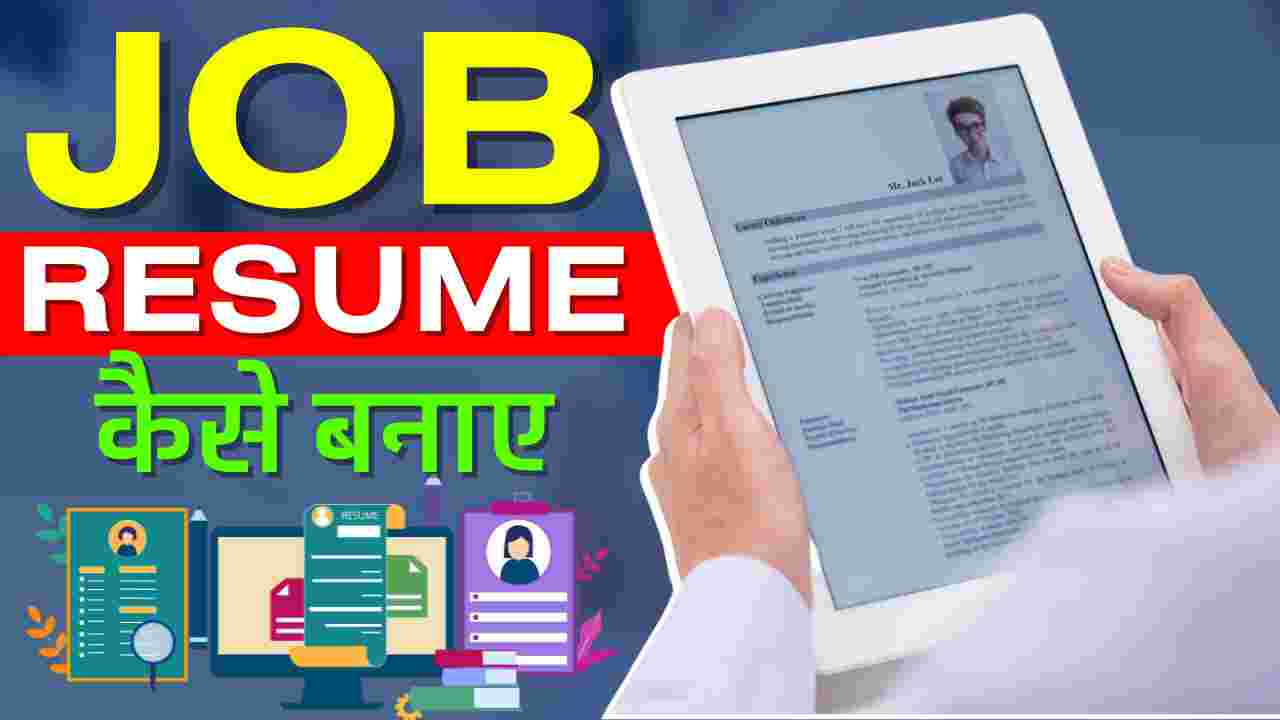How to Make a Resume for a Job :-In today’s competitive job market, having a well-crafted resume is crucial. Your resume is the first step towards securing your dream job. A good resume not only showcases your skills and experience but also highlights why you are the right fit for the job. Here, we will guide you on how to create an effective resume and what key points to keep in mind while making it.
What is a Resume?
A resume is a document that contains your professional and educational details. It includes your name, contact information, educational qualifications, work experience, skills, and other relevant information. Employers first look at your resume to decide whether to invite you for an interview or not.
Key Points to Keep in Mind While Making a Resume
1. Clear and Simple Format
The format of your resume should be clear and simple. Avoid using too many designs or colors. A plain and professional format is the best. Keep the font size and style simple. The best fonts to use are Arial, Times New Roman, and Calibri.
2. Accurate Information
Ensure that the information provided in your resume is accurate and up-to-date. Avoid giving false information. This can damage your credibility and reduce your chances of getting the job.
3. Contact Information
Your contact information should be at the top of your resume. This includes your full name, phone number, and email address. If you have a LinkedIn profile, include its link as well.
4. Objective Statement
Include a short objective or career goals statement in your resume. This explains why you want the job and what your career aspirations are.
5. Educational Qualifications
List all your educational qualifications clearly. Include the name of the degree, the institution you attended, and the year of completion. Mention any special courses you have taken that are relevant to the job.
6. Work Experience
Detail your work experience in chronological order, starting with the most recent job. Under each job, describe your role and responsibilities. Highlight your achievements and contributions.
7. Skills
Clearly list the skills you possess. Include both technical skills and soft skills such as teamwork, communication, and problem-solving.
8. Projects and Internships
If you have worked on any projects or internships, include them in your resume. This shows your practical experience and can make a positive impression on employers.
9. Achievements
Mention any significant achievements such as awards, certifications, and other accomplishments. This shows employers that you are capable and have been recognized for your work.
10. References
If the employer asks for references, include their details. These can be your previous employers or professors who can vouch for your qualifications and work ethic.
Common Mistakes to Avoid
1. Typing and Grammar Errors
Ensure there are no typing or grammar errors in your resume. Proofread it multiple times or have someone else check it.
2. Overly Long Resume
Keep your resume concise. A one or two-page resume is ideal. Employers do not have much time, so include only the necessary information.
3. Personal Information
Do not include too much personal information such as religion, caste, or family details. This is not relevant to a professional resume.
4. Irrelevant Information
Avoid including outdated or irrelevant information. Only include details that are important for the job you are applying for.
The Purpose of a Resume
The main purpose of a resume is to impress the employer and secure an interview. A good resume convinces the employer that you are the most suitable candidate for the job. Therefore, it should be clear, precise, and impactful.
Detailed Steps to Create an Effective Resume
Step 1: Start with a Header
At the top of your resume, include your name, address, phone number, and email address. This makes it easy for the employer to contact you.
Step 2: Write a Strong Objective Statement
Below the header, write a brief objective statement. This should be 2-3 sentences explaining your career goals and what you hope to achieve in the job you are applying for.
Step 3: List Your Education
Start with your highest degree and work backward. Include the name of the degree, the institution, and the year of graduation. Mention any relevant coursework or projects.
Step 4: Detail Your Work Experience
For each job, include the job title, company name, location, and dates of employment. Use bullet points to describe your responsibilities and achievements in each role.
Step 5: Highlight Your Skills
Create a section dedicated to your skills. This can be technical skills relevant to the job, such as software proficiency, or soft skills like communication and leadership.
Step 6: Include Additional Information
Add sections for any projects, internships, volunteer work, or other experiences that demonstrate your abilities and dedication.
Step 7: Mention Your Achievements
Include any awards or certifications that are relevant to the job. This helps to set you apart from other candidates.
Step 8: Add References If Requested
If the job posting asks for references, include their names, job titles, and contact information. Choose references who can speak positively about your professional abilities.
Conclusion
Creating an effective resume is a critical step in your job search. By following the tips and steps outlined above, you can create a resume that stands out to employers. Remember to keep it clear, concise, and relevant to the job you are applying for.
Your resume is your first impression on a potential employer. Make sure it accurately represents your skills and experiences. With a well-crafted resume, you can increase your chances of getting the desired job.
By paying attention to details and avoiding common mistakes, you can create a resume that will catch the employer’s attention and secure you an interview. Good luck with your job search!





